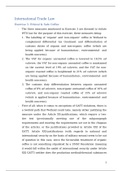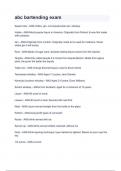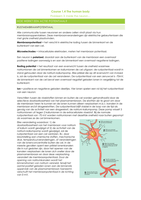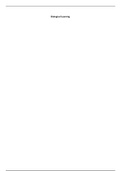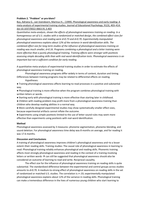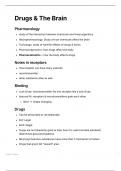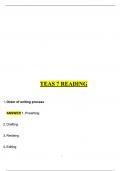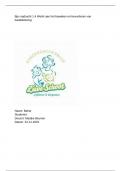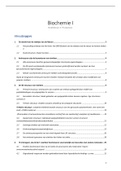International Trade Law
Exercise 5: Ethical & Safe Cofee
- The three measures mentioned in Exercise 3 are deemed to violate
WTO law for the purpose of this exercise, these measures being:
1. The labelling of ‘organic’ and ‘non-organic’ cofee in Welland to
complement diferential tax treatment and diferentiation of
customs duties of organic and non-organic cofee (which are
being applied because of humanitarian-, environmental- and
health concerns);
2. The VAT for organic unroasted cofee is lowered to 18,5% ad
valorem, the VAT for non-organic unroasted cofee is maintained
on the current level of 19% ad valorem, and the VAT for non-
organic roasted cofee is heightened to 21% ad valorem (which
are being applied because of humanitarian-, environmental- and
health concerns);
3. The customs duty diferentiation between organic unroasted
cofee of 8% ad valorem, non-organic unroasted cofee of 10% ad
valorem, and non-organic roasted cofee of 15% ad valorem
(which is applied because of humanitarian-, environmental- and
health concerns).
- First of all, when it comes to exceptions of GATT-violations, there is
a twofold path that Welland could take, namely either justifying the
measure under the Article XX-justifcations, which require a two-
tier test (provisionally meeting one of the subparagraph
requirements and meeting the requirements set out in the chapeau
of the article), or the justifcations provided in Article XXI of the
GATT. Article XXI-justifcations (with regards to national and
international security on the basis of military means) seem to be out
of question in this case, since the favourable treatment of organic
cofee is not something stipulated by a UNSC Resolution (meaning
it would fall within the ambit of international security under Article
XXI GATT) neither does the production method/chemical substances
1
, in the cofee threaten national security in any way relating to
fssionable materials, trade in arms or military materials, and it has
nothing to do with times of war and an emergency in international
relations (meaning it would fall within the ambit of national security
under Article XXI GATT). Hence, we need to look at the violations in
light of Article XX of the GATT.
- Hence, the justifcation of these violations must be sought under
Article XX of the GATT, which requires a two-tier test as stipulated
before. Hereafter, the three measures shall be seen together when
analysing the provided justifcations in Article XX (a) – (j) of the
GATT, but in the analysis of necessity under the frst tier they could
be taken apart and this aspect can then in turn be analysed
separately. Similarly, in the second tier of the test, the measures
will be taken apart when it is needed and analysed separately. The
analysis of Article XX goes as follows:
o Justifcation under (a) – (j), subparagraphs chosen on the
basis of whether they are likely to be approved by the
panel/Appellate Body:
(a) necessary to protect public morals:
In China – Publications and Audiovisual Products,
the Panel established that public morals are to be
defned by the country itself, so in principle,
Welland will be able to meet this criterion if it is
argued that human rights violations and the
concerns about these violations will constitute
public morality. i.e. the objective of the measures
above is protecting public morals with regards to
human rights violations by labelling and
diferentially treating organic and non-organic
cofee;
In line with China – Publications and Audiovisual
Products, Welland should argue that non-organic
cofee beans which have not been produced with
2
Exercise 5: Ethical & Safe Cofee
- The three measures mentioned in Exercise 3 are deemed to violate
WTO law for the purpose of this exercise, these measures being:
1. The labelling of ‘organic’ and ‘non-organic’ cofee in Welland to
complement diferential tax treatment and diferentiation of
customs duties of organic and non-organic cofee (which are
being applied because of humanitarian-, environmental- and
health concerns);
2. The VAT for organic unroasted cofee is lowered to 18,5% ad
valorem, the VAT for non-organic unroasted cofee is maintained
on the current level of 19% ad valorem, and the VAT for non-
organic roasted cofee is heightened to 21% ad valorem (which
are being applied because of humanitarian-, environmental- and
health concerns);
3. The customs duty diferentiation between organic unroasted
cofee of 8% ad valorem, non-organic unroasted cofee of 10% ad
valorem, and non-organic roasted cofee of 15% ad valorem
(which is applied because of humanitarian-, environmental- and
health concerns).
- First of all, when it comes to exceptions of GATT-violations, there is
a twofold path that Welland could take, namely either justifying the
measure under the Article XX-justifcations, which require a two-
tier test (provisionally meeting one of the subparagraph
requirements and meeting the requirements set out in the chapeau
of the article), or the justifcations provided in Article XXI of the
GATT. Article XXI-justifcations (with regards to national and
international security on the basis of military means) seem to be out
of question in this case, since the favourable treatment of organic
cofee is not something stipulated by a UNSC Resolution (meaning
it would fall within the ambit of international security under Article
XXI GATT) neither does the production method/chemical substances
1
, in the cofee threaten national security in any way relating to
fssionable materials, trade in arms or military materials, and it has
nothing to do with times of war and an emergency in international
relations (meaning it would fall within the ambit of national security
under Article XXI GATT). Hence, we need to look at the violations in
light of Article XX of the GATT.
- Hence, the justifcation of these violations must be sought under
Article XX of the GATT, which requires a two-tier test as stipulated
before. Hereafter, the three measures shall be seen together when
analysing the provided justifcations in Article XX (a) – (j) of the
GATT, but in the analysis of necessity under the frst tier they could
be taken apart and this aspect can then in turn be analysed
separately. Similarly, in the second tier of the test, the measures
will be taken apart when it is needed and analysed separately. The
analysis of Article XX goes as follows:
o Justifcation under (a) – (j), subparagraphs chosen on the
basis of whether they are likely to be approved by the
panel/Appellate Body:
(a) necessary to protect public morals:
In China – Publications and Audiovisual Products,
the Panel established that public morals are to be
defned by the country itself, so in principle,
Welland will be able to meet this criterion if it is
argued that human rights violations and the
concerns about these violations will constitute
public morality. i.e. the objective of the measures
above is protecting public morals with regards to
human rights violations by labelling and
diferentially treating organic and non-organic
cofee;
In line with China – Publications and Audiovisual
Products, Welland should argue that non-organic
cofee beans which have not been produced with
2

